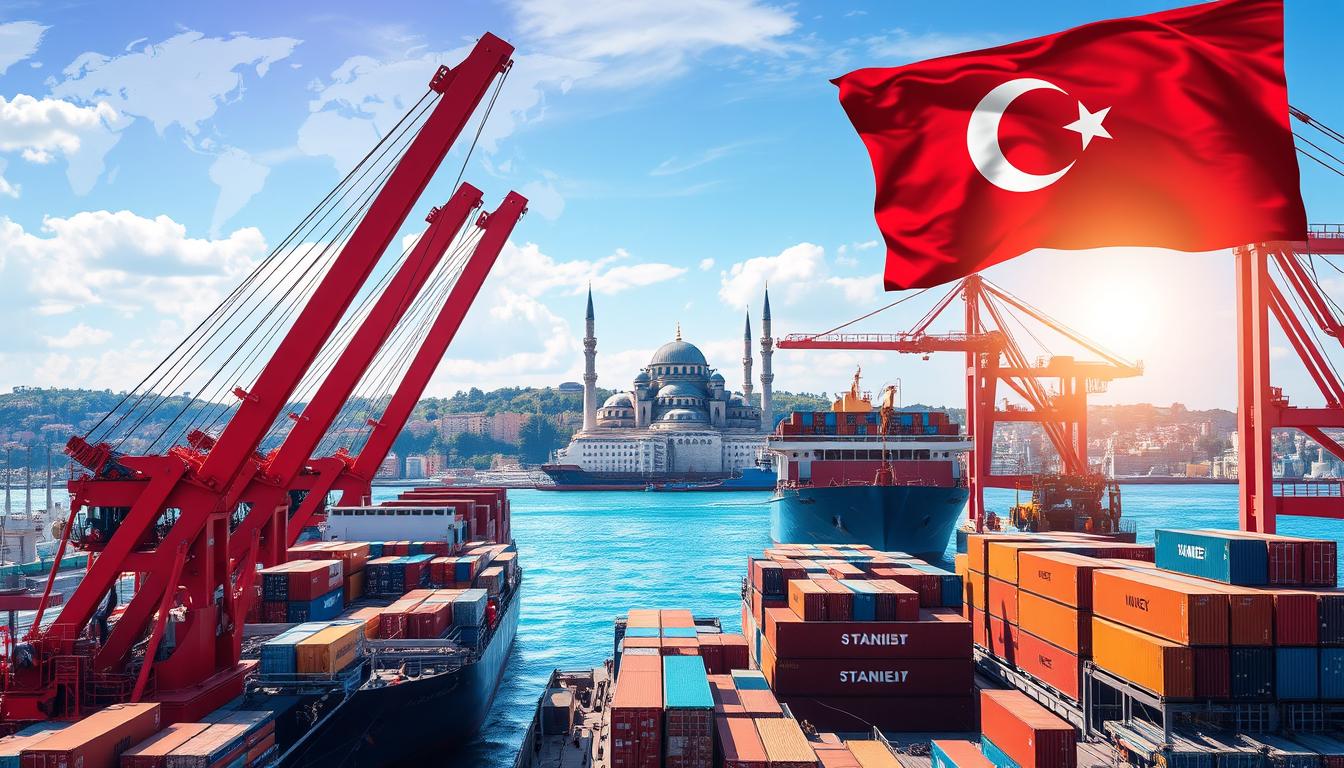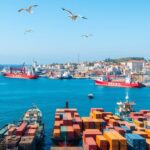
Unlock 5 Key Benefits of Global Shipping & Export from Turkey!
Unlock 5 Key Benefits of Global Shipping & Export from Turkey!
Turkey is a key player in global trade, attracting businesses from around the world. Its strategic location makes it a hub for international shipping. This opens up new opportunities for traders looking to grow their businesses.
In this article, we’ll explore the main benefits Turkey offers. These advantages can help your business expand globally. Turkey’s strong logistics, diverse economy, and support from the government make it a great place to start or grow your business.
Key Takeaways
- Exploit Turkey’s geographical locational treasures for streamlined global trade.
- Unlock the potential of a diversified Turkish export market.
- Discover the robust logistical framework supporting Turkey’s export juggernaut.
- Benefit from attractive government incentives fostering export growth.
- Leverage the latest advancements in technology to amplify your trade efficiency.
Introduction to Global Shipping & Turkey’s Geographical Advantage
The world of international logistics is growing fast. Places with strategic locations play a big role in global transport networks. Turkey, at the meeting point of Europe and Asia, is a key player in global shipping and logistics. Its location boosts Turkey’s role in international trade.
Turkey has always been a key spot for trade, connecting East and West. This history helps Turkey today in global transport networks and international logistics. Turkey’s location helps its economy and makes international logistics smoother.
Turkey is well-connected to global transport networks. These networks help move goods across the world. They offer chances for businesses to make their operations more efficient through Turkey’s logistics.
| Aspect | Description |
|---|---|
| Global Reach | Connection to numerous international markets via sea, air, and land. |
| Economic Zones | Strategic free zones enhancing trade relations and economic synergies. |
| Logistics Performance | High rankings in global logistics performance indices. |
Turkey’s history and future plans show its big role in global transport networks and international logistics. It not only strengthens Turkey’s economy but also meets the changing needs of global trade. Turkey is more than just a transit point; it’s a key operational hub in international trade.
Understanding Turkey’s Export Landscape
Turkey sits between Europe and Asia, making it key in both politics and economy. Its exports show how it has grown by diversifying and improving in key areas. This has led to big economic gains.
The Composition of Turkish Exports
Turkey’s exports mix old and new, showing its culture and tech progress. Textiles, cars, and farm goods top the list. Its location helps grow crops like dried fruits, tobacco, and tea.
The car industry has grown fast, making Turkey a big player worldwide.
Key Industries Fueling Turkey’s Economy
Turkey’s economy grows thanks to its main industries. The car sector, with lots of foreign money and skills, is a big winner. The textile industry is also a big player, known for quality and new ideas.
The farm sector is diverse, meeting local needs and helping Turkey as a global food supplier.
These sectors show Turkey’s use of its location, people, and tech to grow its economy. As they keep improving, Turkey’s role in the world economy will only get stronger.
The Strategic Role of Turkey in International Trade
Turkey’s location as a Eurasian bridge makes it key for trade. It’s a strategic trade hub, vital for connecting Eurasia. This spot makes Turkey a central player in global trade and a key part of the Belt and Road impact.
Connecting Europe and Asia: A Trade Bridge
Turkey sits between Europe and Asia, making it a crucial trade link. Its long coastlines and modern ports help trade flow smoothly. This role boosts Turkey’s importance in global shipping and trade.
The Impact of the Belt and Road Initiative
The Belt and Road Initiative (BRI) has greatly helped Turkey. It has brought in investments for roads, rails, and ports. This has made Turkey a bigger player in trade.
The BRI has also improved Turkey’s physical links with Eurasia. It has raised Turkey’s status in trade, promising more growth and connections.
Comprehensive Overview of Turkey Logistics
Turkey is a key link between Europe and Asia, making its logistics vital for global trade. Its strategic location boosts supply chain efficiency. It serves both regional and international markets well.
Advanced Infrastructure and Transportation Networks
Turkey has made big investments in its logistics, including ports, railways, and highways. This network helps move goods smoothly across continents.
- Ports: Turkey’s ports are major gateways for international trade. They handle millions of tonnes of cargo each year, thanks to advanced technology.
- Railways: Turkey has upgraded its railways. This makes cargo transit faster and more reliable over long distances.
- Highways: Turkey’s highways are a key part of its transport system. They help move goods quickly and affordably inland.
The combination of these transport modes makes Turkey a key logistical hub. It improves supply chain operations and expands market reach.
Innovations in Turkish Supply Chain Management
Turkey is working hard to make its supply chain more efficient. It has introduced new practices to improve logistics and service quality. These changes make processes smoother and cut down on transit times.
- Automated Systems: Turkey uses automation in warehouses and inventory management. This reduces errors and speeds up processing.
- Data Analytics: Turkey uses big data to predict market trends. This helps manage supply and demand better.
- Eco-friendly Logistics: Turkey is focusing on sustainable logistics. It’s investing in green technologies to lower the carbon footprint of logistics.
By integrating these advanced technologies, Turkey’s logistics infrastructure keeps getting better. This raises the bar for supply chain management and operational excellence.
Exploring the Seas: Benefits of Turkey’s Maritime Shipping
Turkey shines in maritime logistics thanks to its efficient trade and strategic shipping lanes and port infrastructure. Its location is key for major sea routes, connecting local and global markets. This boosts Turkey’s role in international trade.
Turkey’s maritime logistics success comes from its wide network of ports. These ports are built to handle large amounts of cargo well. The growth of these ports is crucial for meeting trade demands, driving economic growth, and ensuring goods move smoothly across the world.
The role of Turkey’s port infrastructure is clear in its ability to connect the Mediterranean and Black Seas to global markets. This connection is more than just geography. It involves advanced logistics, from modern container handling to complex systems, making shipping smoother.
The strategic placement of Turkish ports along key shipping lanes enhances accessibility to international waters. This makes transport faster and cheaper for global businesses.
| Key Port | Annual Cargo Handling Capacity (in Tonnes) | Facilities |
|---|---|---|
| Mersin | Over 1.7 million | Container, General Cargo, Bulk |
| Ambarli | Over 3 million | Container, Ro-Ro, Liquid Cargo |
| Izmir | Approximately 1.2 million | General Cargo, Container, Passenger |
Turkey’s port infrastructure and maritime logistic services give it a competitive edge in global trade. This shows Turkey’s ability to play a big role in the world’s shipping industry.
Delving into Air Transport: Turkey’s Sky-High Potential
Turkey’s air transport sector is growing fast, thanks to the rise in global trade. Turkey’s major airports are key in boosting freight across Europe, Asia, and more. They aim to increase capacity and efficiency.
Expansion of Air Freight Opportunities
The growth of air freight in Turkey meets the needs of export industries. It also opens doors for international businesses looking for fast, reliable access to markets. Turkey’s investment in air transport has cut down cargo transit times.
Key Airports Driving Export Efficiency
Istanbul Airport shows Turkey’s vision in air transport. It’s a major airport that can handle a lot of cargo. This supports the growth of air freight and global exports.
Other airports like Ankara and Izmir are also important. They help Turkey’s logistics and offer direct flights to big economic centers. Turkey aims to keep improving air transport to meet global logistics needs.
Optimizing Road and Rail Networks for Export
Improving road and rail logistics is key to better trade. Turkey is working hard to upgrade its transport systems. This boosts its exports and helps revive the Silk Road through rail.
Modern Highways Propelling Trade
Turkey focuses on building and keeping high-speed highways in top shape. These roads are like veins, carrying trade smoothly across the area. They link important industrial areas to ports and logistics centers, cutting down on travel time and costs.
This makes Turkey a key spot for trade between continents. It strengthens its road and rail network.
Revitalization of the Historic Silk Road by Rail
The Silk Road’s revival through rail shows Turkey’s smart use of its location. Better rail links help tie Asia and Europe closer economically. This boosts Turkey’s role in global rail logistics and its role in the Silk Road revival.
| Transport Mode | Contribution to Trade Flow | Impact on Export |
|---|---|---|
| Road | High-speed, flexible delivery | Enhances quick market access |
| Rail | High-volume, eco-friendly transit | Supports large-scale distribution |
Scaling these networks fits into bigger trade improvement plans. Making road and rail work together boosts the economy. It also makes supply chains more reliable, which is vital for global trade growth.
“Turkey Logistics”: Enhancing Global Supply Chains
We’re working hard to improve global trade, and Turkey’s logistics sector is key. The focus on supply chain enhancement has made Turkey a major player in global trade facilitation.
Stakeholders in Turkey’s logistics sector are working together. They aim to create new efficiencies that help trade across the world. This effort is making Turkey a crucial part of global trade routes.
The improvement process is complex. It includes better infrastructure, technology, and partnerships across continents. This effort boosts Turkey’s role in global freight and connects Europe and Asia better.
| Aspect | Impact | Initiatives |
|---|---|---|
| Infrastructure Improvement | Enhanced capacity and efficiency in cargo handling | Development of key maritime and land routes |
| Technology Integration | Real-time tracking and automated systems | Installation of AI-driven logistics solutions |
| Global Partnerships | Expanded access to new markets | Collaboration with foreign logistics giants |
These efforts make trade smoother and faster. They also strengthen Turkey’s position in global trade facilitation. As we grow our logistics, we help businesses worldwide use Turkey’s great location and strong infrastructure.
Sustainable Practices in Turkey’s Global Transport Initiatives
We’re working hard to make our logistics more sustainable. We’re adding green strategies to Turkey’s transport and climate change adaptation plans. These steps are key to lowering the environmental harm from our global transport.
Green Logistics: Eco-friendly Strategies
Turkey’s logistics sector is using new eco-friendly ways to be more sustainable. They’ve made big improvements by switching to cleaner fuels and electric vehicles. This move aims to cut down greenhouse gas emissions a lot.
They’re also working on better routes and loading to need fewer trips. This helps lower the carbon footprint even more.
Adapting to Climate Change and Reducing Carbon Footprint
They’re taking serious steps to fight climate change. By moving more freight from road to rail and sea, they’re showing their dedication to climate change adaptation.
| Strategy | Implementation | Impact |
|---|---|---|
| Electric Vehicles in Fleet | 2022-2025 Rollout | Reduce emissions by 30% |
| Eco-friendly Packaging | Ongoing | Decrease waste by 25% |
| Modal Shifts | 2021-2023 Enhancement | Lower emissions by 40% |
The Impact of Technological Advancements on Export from Turkey
In the world of international trade, tech-driven logistics have changed how goods move across borders. In Turkey, using export technology has boosted its role on the global scene. Now, Turkish products get to markets quicker and more reliably than before.
The move to digitalization of trade in Turkey’s exports has made transactions smoother. It also helps follow international trade rules better. This tech upgrade has made customs processes more efficient and clear. It cuts down the time goods spend in ports and makes customers happier.
- Digitalized customs procedures mean reduced waiting times at borders.
- Real-time tracking systems enhance the reliability of delivery schedules.
- Advanced data analytics optimize shipping routes and loads.
These tech improvements don’t just make things run smoother. They also give Turkish businesses a chance to reach out to more markets worldwide.
Thanks to tech-driven logistics, Turkey’s export sectors like textiles and cars have grown a lot. This growth comes from using smart software and automation. These tools cut down on mistakes and make the export process smoother.
The shift to digitalization of trade is more than just getting new tech. It’s about changing how we think about shipping and logistics. It’s about moving towards innovation and efficiency in all parts of international trade.
“Technology is the great enabler of modern trade and logistics,” reflects the current trend toward integrating digital practices in all facets of shipping and trade.
This smart use of technology is pushing Turkey ahead. It’s setting a high standard for other countries wanting to grow their global trade through digital means.
Global Shipping and Export Incentives Provided by the Turkish Government
The Turkish government is focusing on boosting its economy through trade incentives. These incentives aim to grow the shipping and export sectors. This makes Turkey a key player worldwide.
Fiscal Advantages and Tax Breaks for Exporters
Turkey’s strategy includes offering big tax cuts to exporters. These tax breaks help reduce costs for businesses. This makes it easier for them to compete globally.
Investment in Technology and Infrastructure Development
The Turkish government also invests in technology and infrastructure. This includes building modern logistics and transportation systems. These advancements improve efficiency and lower costs for exporters.
In summary, businesses can save money and grow globally by using these trade incentives. Turkey’s efforts show its commitment to expanding its economy and supporting global trade.
Challenges and Solutions in Expanding Turkey’s Export Market
Turkey is facing tough challenges in growing its export market. Geopolitical issues and global trade tensions are major hurdles. These need a smart plan to overcome trade barriers and improve regulatory navigation.
Addressing Trade Barriers and Navigating Regulations
Turkey is tackling these problems by making trade deals and simplifying rules. These steps help get into markets easier and attract foreign investment. This is crucial for resilient trade practices.
Building Resilience in Global Trade Dynamics
The strategy also includes making the economy stronger to handle global shocks. This helps Turkey keep trading even when things get tough. It also keeps the economy stable against outside problems. Building strong infrastructures and quick response systems is key to dealing with trade ups and downs.
| Issue | Strategy | Outcome |
|---|---|---|
| Geopolitical Tensions | Strategic Diplomacy and Trade Agreements | Reduced Barriers |
| Regulatory Complexity | Regulatory Streamlining | Enhanced Market Access |
| Economic Shocks | Resilient Practices | Stabilized Trade Flows |
By being proactive in overcoming trade barriers and regulatory navigation, Turkey is shaping a strong, resilient, and competitive trade scene. This not only tackles current issues but also prepares for future chances.
Mitigating Risks in International Trade with Turkey
In today’s global market, risk mitigation is key for secure trade. This is especially true when dealing with reliable Turkish exports. Our strategies aim to keep every transaction honest and trustworthy. This way, businesses around the world can trade with Turkey with confidence.
Turkey’s location and strong economy make its trade system strong. It has many measures to reduce risk mitigation and ensure secure trade. These include top-notch security for transactions, wide insurance choices, and political stability. All these help make Turkish exports more reliable.
- Advanced digital security systems to ensure transaction safety
- Partnerships with globally recognized insurance firms to cover a range of risks
- Political frameworks and agreements that support consistent trade policies
| Aspect | Impact | Implementation in Turkey |
|---|---|---|
| Digital Security | Protects transactions | State-of-the-art encryption and IT security |
| Insurance Coverage | Mitigates financial risk | Comprehensive options available for all export goods |
| Political Stability | Ensures reliable trade conditions | Consistent, exporter-supportive policies |
We know how important it is to have good measures for reliable Turkish exports. These steps not only protect our partners but also make our trade system better and more respected.
Conclusion
In this article, we’ve explored how Turkey’s strategic location and strong infrastructure are key to global shipping success. We’ve seen how Turkey connects continents and boosts industries and technologies. It’s a crucial gateway that links different economies and a hub for trade efficiency.
Turkey’s export growth is impressive, even with changing global trade trends. Companies looking to expand internationally should think about working with Turkey. The country’s maritime, air freight, and land networks show its growing role in trade.
We urge international traders to explore Turkey’s logistics sector. It offers many opportunities, from sustainability to technology. Working with Turkey can make your business more profitable and efficient. Consider Turkey as your partner for success in global shipping and export growth.
FAQ
What are the key benefits of exporting from Turkey?
Turkey’s location between Europe and Asia is a big plus for exports. It has a strong logistics system and a diverse economy. The government also offers incentives for traders. Plus, Turkey’s logistics and transport systems are getting better with technology.
How does Turkey’s geographical advantage benefit international shipping?
Turkey’s spot between Europe and Asia makes it a key transit point. This location cuts down on shipping times and costs. It makes Turkey a crucial part of global trade routes.
What commodities and industries are at the forefront of Turkey’s exports?
Turkey leads in automotive, textiles, and agriculture exports. It has a wide range of goods that meet global needs. This boosts Turkey’s economy a lot.
In what ways does Turkey serve as a strategic trade hub in international commerce?
Turkey connects European and Asian markets, boosting trade. The Belt and Road Initiative has improved Turkey’s infrastructure. This makes Turkey a key player in global trade.
What advancements in logistics and supply chain management are evident in Turkey?
Turkey has improved its logistics and supply chain. It has a well-built infrastructure and uses new methods. This makes supply chains more efficient and faster.
Why is maritime shipping beneficial in Turkey?
Turkey’s long coastline and access to key shipping lanes are big pluses. Its modern ports support global trade. This makes maritime shipping in Turkey very beneficial.
How is air freight expansion impacting Turkey’s global shipping potential?
Air freight growth in Turkey, especially at Istanbul Airport, is a big plus. It has increased Turkey’s role in global shipping. This makes exports more efficient and connects Turkey to the world faster.
How are Turkey’s road and rail networks optimized for export?
Turkey has modernized its highways and revamped the Silk Road. This has made its road and rail systems top-notch for trade. It offers advanced solutions for logistics.
What roles do sustainable practices play in Turkey’s transport sector?
Turkey is focusing on green logistics and eco-friendly strategies. It’s adapting to climate change and trying to reduce its carbon footprint. This is a big part of its transport sector.
What impact have technological advancements had on Turkey’s export capabilities?
Technology has changed Turkey’s exports for the better. It has made trade processes digital, introduced tech solutions, and improved customs procedures. This has made shipping from Turkey more efficient.
What incentives does the Turkish government offer for global shipping and export activities?
Turkey offers many incentives for shipping and exports. This includes tax breaks, fiscal advantages, and investments in tech and infrastructure. These make Turkey a more attractive trade partner.
How is Turkey addressing challenges in expanding its export market?
Turkey is tackling export market challenges head-on. It’s working to overcome trade barriers and make regulations easier. This includes negotiating trade deals and improving trade practices.
What measures are in place to mitigate risks in international trade with Turkey?
Turkey has set up secure ways to do business and reliable insurance. It’s also focused on keeping politics stable. These steps make trade with Turkey safe and profitable for businesses worldwide.





